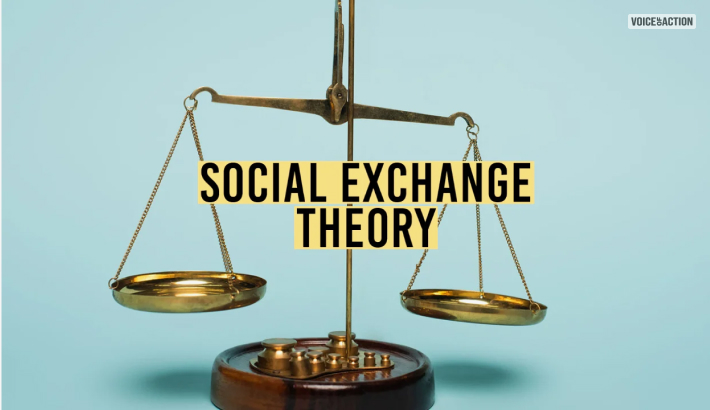Social Exchange Theory: How To Unlock Its Business Benefits?

In the realm of business dynamics, relationships, and interactions play a pivotal role in shaping success. Enter the Social Exchange Theory, a concept that delves into the intricacies of human interaction and its implications for businesses.
By exploring the nuances of this theory, we can gain valuable insights into how businesses can harness the power of social exchanges to cultivate meaningful connections, enhance customer loyalty, and drive growth.
In this post, I’ll be explaining the fundamentals of this theory and its benefits for businesses in a casual yet informative manner.
What Is The Social Exchange Theory?

At its core, the Social Exchange Theory revolves around the idea that individuals engage in interactions with an expectation of receiving something in return. The role of manager also encompasses such a concept.
This “something” could be tangible or intangible, such as rewards, favors, information, or emotional support.
From a bottled and jarred packaged goods business perspective, this theory posits that individuals engage with companies and brands based on the perceived benefits they anticipate receiving in exchange for their time, money, or efforts.
Understanding The Concepts Of Social Exchange Theory

Some of the key concepts of social exchange theory that businesspersons must understand are:
1. The Rational Decision-Making Lens
Central to the Social Exchange Theory is the concept of rational choice exchange theory. Individuals are seen as rational actors who weigh the potential benefits against the perceived costs before engaging in social exchanges.
This process of evaluation influences whether someone chooses to enter, maintain, or terminate a relationship or interaction.
2. Rewards, Costs, And Comparison Level
The crux of the Social Exchange Theory lies in the balance between rewards and costs. People gauge their satisfaction within relationships by comparing the actual relationship reward and costs experienced to their “comparison level.”
This comparison level is influenced by past experiences, cultural norms, and personal expectations. If the rewards outweigh the costs and exceed the individual’s comparison level, the relationship is perceived as positive and fulfilling.
3. Comparison Level For Alternatives
Taking it a step further, the Social Exchange Theory introduces the concept of the “comparison level for alternatives.”
Exchange theory sociology refers to an individual’s assessment of how well their current relationship measures up against potential alternatives. If the current relationship is perceived as better than the alternatives.
4. Equity And Inequity
Equity, fairness, and reciprocity are key elements within the Social Exchange Theory. When both parties in a relationship perceive that their contributions and rewards are balanced, equity prevails. However, when there is a perceived imbalance, inequity arises, potentially leading to strain within the relationship.
5. Investment Model
The Social Exchange Theory introduces the investment model, which expands the scope of analysis. It factors in the notion that individuals remain committed to relationships not only based on rewards and costs but also on the investments they have made.
These investments could be emotional, financial, or time-related. The more investments individuals make in a relationship, the more likely they are to work through challenges and maintain the relationship.
6. Relationships At The Workplace
The theory’s application isn’t limited to customer relationships alone. The Social Exchange Theory sheds light on the dynamics of relationships within organizations.
Employees evaluate their workplace experiences based on the rewards they receive (such as compensation, growth opportunities, and job satisfaction) and the costs they incur (like effort, stress, and time). In addition, managerial communication also plays a big part.
Understanding this dynamic helps businesses create environments that foster employee satisfaction, engagement, and retention.
How Does The Social Exchange Theory Benefit Businesses?

The social exchange theory benefits all businesses and the best paying jobs in capital goods in a myriad number of ways. Some of its core benefits are:
1. Cultivating Customer Loyalty
From a business standpoint, understanding the Social Exchange Theory can unlock a treasure trove of strategies to cultivate customer loyalty. By consistently delivering value, excellent products, and exceptional customer service, businesses can establish a positive exchange dynamic.
When customers feel that they are receiving more value than they are investing, they are more likely to remain loyal to the brand.
2. Enhancing Customer-Brand Relationships
The Social Exchange Theory emphasizes the importance of reciprocity in relationships. In the business context, this translates to building and nurturing strong customer-brand relationships.
Businesses that go the extra mile to understand customer needs, engage in personalized diagonal communication and grapevine communication, and offer tailored solutions to create a sense of reciprocity. Customers are more inclined to stay loyal when they feel that the brand truly cares about their preferences and requirements.
3. Influencing Purchase Decisions
Every purchasing decision involves a form of social exchange perspective. Consumers evaluate whether the benefits they expect from a product or service outweigh the costs.
Businesses that effectively communicate the value proposition of their offerings can sway this exchange in their favor. Clear messaging about the benefits, features, and unique selling points can tip the scales in favor of a positive purchasing decision.
4. Building Trust And Credibility
Trust is a fundamental component of successful customer relationships. The Social Exchange Theory underscores that trust is built through consistent positive interactions and reliable exchanges.
Businesses that consistently deliver on promises address concerns promptly and provide transparent communication in management foster a sense of trust and credibility among their customer base.
5. Creating a Win-Win Dynamic
The essence of the Social Exchange Theory lies in creating a win-win dynamic for both parties involved. Businesses that prioritize delivering value to customers not only reap the rewards of customer loyalty but also benefit from positive word-of-mouth marketing.
Satisfied customers are more likely to share their positive experiences with others, creating a ripple effect that can drive new customer acquisitions.
6. Fostering Employee Engagement
The principles of the Social Exchange Theory extend beyond customer relationships to internal dynamics. Businesses that invest in employee well-being, growth opportunities, and a positive work environment foster a reciprocal dynamic.
Engaged employees who feel valued are more likely to invest their energy and efforts into their roles. This leads to improved productivity and a more positive company culture.
Conclusion: Unlocking the Power of Social Exchange Theory
In the realm of business, the Social Exchange Theory provides a valuable lens through which to understand the dynamics of customer-brand interactions and internal relationships.
By recognizing the importance of reciprocity, businesses can craft strategies that prioritize delivering value, building trust, and creating win-win outcomes.
In a landscape where competition is fierce, and customer loyalty is paramount, mastering the art of social exchange can be the key to standing out, fostering strong connections, and driving sustained growth.
As you navigate the ever-evolving business landscape, keep in mind the principles of this theory as a guide to building meaningful, beneficial relationships that contribute to the success and longevity of your business.
More Resources:


























